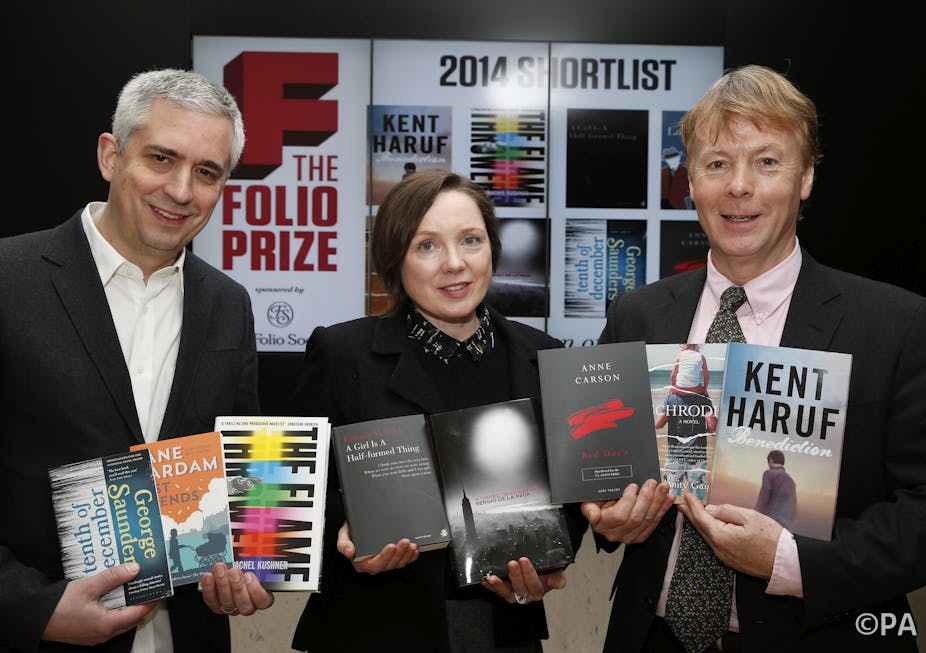The winner of The Folio Prize is announced on 10 March. This prize may be young, but it has already administered some high profile snubs. Its creation was in itself an implied criticism: founded as a response to the Man Booker Prize judges’ announcement in 2011 that they were looking for “readability” in their prize winners. It was to be a prize dictated more by the values of writers, who are “looking for the new thing, always”, rather than readers, who “tend towards the conservative”.
The inaugural shortlist was announced in February and, true to form, it ruffled some feathers. The subject of controversy shifted, however, from questions of cultural value to national identity: why so many Americans, and, where were the British authors?
The selection of just one British author in a shortlist of eight seems a particularly bad omen for 2014. This, after all, is the year that the Man Booker will open to American authors for the first time. Like the Folio Prize, the Man Booker has a British sponsor and will continue to call for English language books published in the UK, but this is no guarantee that it will prevent British fiction from being crowded out by a stampede of talent from across the Atlantic.
These fears may well prove misplaced, but the domination of the shortlist by five American authors bears further examination. The line-up is, in some ways, a stimulatingly eclectic mix. It places Eimar McBride’s fragmented and incantatory A Girl Is A Half-formed Thing — reportedly rejected six times before finding a publisher — alongside the more feted and familiar George Saunders. Canadian poet Ann Carson’s high literary experimentation in her arresting Red Doc*>* is recognised, as well as the more comforting rhythms of Kent Haruf’s Benediction, a restrained story of small town life in Colorado. It even flirts with genre fiction, singling out Sergio de la Pava’s A Naked Singularity, an epic tale of the seamy side of the New York legal system whose masterful plotting has drawn comparisons with The Wire.
The overshadowing of British literature by American is usually blamed on a national tendency to keep our gaze trained stubbornly on the past and the parochially particular. But the only British text singled out for praise by Folio Prize judges seems to typify exactly this tradition. Jane Gardam’s Last Friends is the final instalment of a tale of two rivals slugging it out against the backdrop of the Empire in decline who, in this novel, bicker out their last days in the familiar setting of an English country village.
Gardam represents an old-guard who, though her characters often venture abroad, remains anchored in a staunchly British register and perspective. This stands in contrast to the young writers selected for last year’s Granta Best of Young British Novelists, who tend to look to far flung settings and peripheral people, capturing a picture of a far more mobile and mutable world.
This is not to say that the Folio Prize chose the wrong sort of British novelist, so much as to remark on an irony. While the Granta prize only admits British authors but seems to prefer cosmopolitan literature, the Folio Prize — which is open to all literature in English published in the UK — seems to be the more narrow of the two in its global perspective.
But this is consistent with a prize which claims to “tick no boxes”. The Folio Prize’s judges opted to keep questions of their author’s identity, national and otherwise, out of the frame: “We forgot about the authors and focused on the books”, arguing that their only concern was to locate “the art of fiction at full stretch”.
The result is a list of exclusively white American and European authors whose novels are, for the most part, rooted in their authors’ countries of origin. This is the more surprising considering the judging panel, which included Vietnamese-Australian Nam Le and Indian Pankaj Mishra, both authors whose work reconfigures received notions of the “west and the rest” in the age of globalisation.
What is problematic here is not so much the novels selected: the Folio judges claim to have used a purely aesthetic criteria in their decisions, un-inflected by a subjectivity formed in a national context. But the shortlisted works are in fact highly culturally specific. They largely fit into the Euro-American tradition of the realist novel or of modernist experimentalist fiction, and they draw on roots in American and European literary texts and mythology.
This is not in itself a weakness, but to “forget” that this is so and to declare the virtues of this tradition to be universally superior masks an underlying cultural chauvinism. The question of the absence of British authors is legitimate, but it is a revealingly small question. There are 375 million people who speak English as a first language in the world today: perhaps we were lucky to get one of ours in at all.

